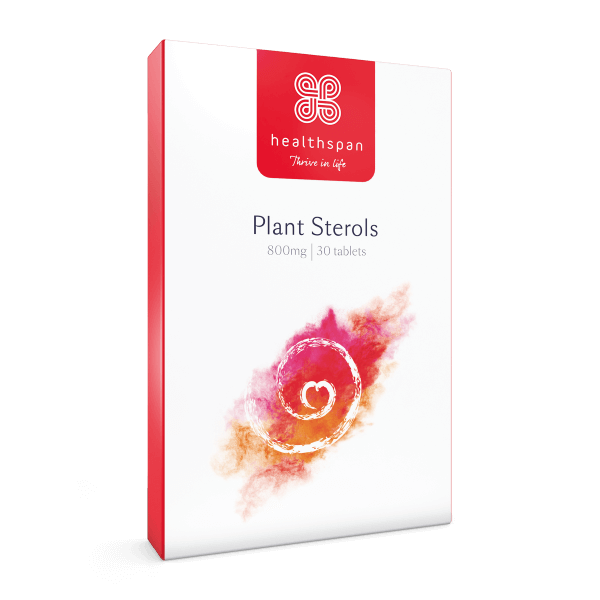Discover the heart health warnings you may not know about and how to keep an eye on your cardiovascular health.
A study of 2,000 adults commissioned by Healthspan found that a majority of women were not aware of either their blood pressure or cholesterol levels, despite the clear links with cardiovascular problems. What's more, most women were also not aware of some of the common signs of a heart attack.
It's estimated that around half of adults in the UK have high cholesterol, but due to the lack of a standard method of data collection and reporting, according to Public Health England1 exact numbers are unknown.
Healthspan's study found that 58% of women had no idea of their blood pressure, and 77% did not keep up to date on their cholesterol levels.
What's more, one in ten admitted that although they had diagnosed coronary heart disease (CVD), they had not had it checked, and 19% of women had not made any changes to help protect their coronary health.
The research also showed that the majority were unaware of the signs of a heart attack; 80% were unaware that back pain could be a sign, 64% didn't know that feeling sick could point to a problem, and 59% didn't see feeling light-headed as a potential sign of heart disease.
What is cholesterol?
High cholesterol is one of the most significant risk factors for CVD. Globally, a third of ischaemic heart disease (disease caused by narrowed arteries) is attributable to high cholesterol.1
Cholesterol is an essential fat (lipid) found in our bloodstream. It is produced by the liver, but also found in various food sources such as full-fat dairy products, egg yolks, shellfish and organ meats.
There are two types of cholesterol: 'good' HDL (high density lipoprotein) cholesterol and 'bad' non-HDL cholesterol, which is essentially all other forms found in the circulation. High levels of 'bad' cholesterol can lead to a build-up of fatty deposits in arteries, and levels tend to increase as we age.
'Good' HDL cholesterol is vital for health: It is used by the body to make hormones, vitamin D and bile acids, and maintain healthy cell membranes.
There are a variety of genetic, health and lifestyle factors that can raise your 'bad' non-HDL cholesterol, whether it's an immediate family member with high cholesterol, having type 2 diabetes, not being physically active, smoking or following a diet high in fats, both animal and saturated.
High cholesterol doesn't necessarily cause any symptoms (in most cases it only causes emergency cardiovascular events), but 31% of those surveyed had never had their cholesterol levels checked.

It's possible to get your blood pressure, cholesterol and blood sugar levels checked at pharmacies, says cardiologist Dr Ameet Bakhai.
Checking your cholesterol
Consultant cardiologist Dr Ameet Bakhai from the Spire Bushey Hospital stresses that regular check-ups and screening are necessary, as is knowing your blood pressure and cholesterol numbers. You should also keep an eye on your step count, as it's vital to keep mobile; 4,000 steps a day is a good benchmark.
Dr Bakhai explains that you can now get your blood pressure, cholesterol and blood sugar levels checked at pharmacies: "Pharmacies are really stepping up, because we're starting to get empowered to look after our own health."
If your cholesterol is normal, then a recheck every 5 years is a good idea. However, if you have raised cholesterol, and you are on cholesterol-lowering medication such as statins, it should be checked at least every year or as often as your doctor advises.
According to the British Heart Foundation, there are around 7-8 million people currently taking lipid-lowering drugs such as statins.2 Statin drugs lower cholesterol by blocking an enzyme (HMG-CoA reductase) in the liver. However, this enzyme is also needed to make ubiquinol, with the result that blood levels can fall by around a half within eight weeks.3
Women may experience different side effects to men when taking statins, such as increased muscle aches and pains, which may cause them to want to stop treatment altogether.
Women's heart health symptoms
Women's heart health symptoms may be milder than men's, plus they can arise later in the illness and can be unusual.
33% of women with heart disease won't experience chest pain. Dr Bakhai advises: "Women don't automatically experience the crippling chest pain, but they are as likely to suffer with pain in the arm, shortness of breath and feel sick, sweaty and dizzy. Other women report feeling extreme tiredness and sudden panic and confusion. To summarise, the symptoms can sometimes be subtle and may be difficult to pinpoint."
Can diet and supplements help?
At the 2017 European Society of Cardiology conference, a study was presented revealing that those with a history of cardiovascular disease who follow a Mediterranean-style diet had a 37% lower risk of dying. Research has also found that a Mediterranean-style diet can reduce both systolic and diastolic blood pressure by 1-2mm/Hg, and greater reductions were seen in the long term.4
Plant sterols may also be beneficial to take for your heart health, as they have been shown to aid in lowering and maintaining normal cholesterol levels. What's more, vitamin B1 (thiamine) contributes to the normal function of the heart.

Plant Sterols 800mg
Proven to maintain or lower cholesterol
- Blocks the absorption of dietary cholesterol
- One tablet a day maintains normal cholesterol levels
- Three tablets a day (2.4g) lowers cholesterol levels






